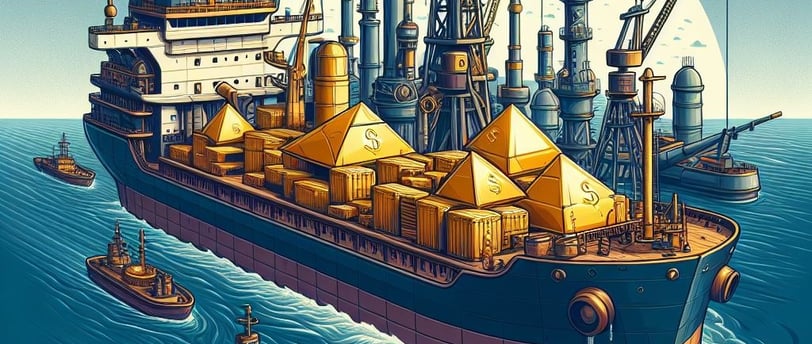The Most Valuable Commodities Shaping the Global Economy
Explore the vital role of commodities in the global economy, from gold and oil to lithium and rare earth elements. Uncover their market dynamics, investment potential, and how they impact future trends across sectors. Dive into the significance of precious metals, energy sources, key agricultural goods, and technology metals in driving economic growth and shaping the future.


Commodities play a crucial role in shaping the global economy. From traditional powerhouses like gold, oil, and agricultural products to emerging stars in the tech industry such as lithium and rare earth elements, these commodities have a significant impact on market dynamics, investment appeal, and future trends. In this article, we will explore the market dynamics, investment potential, and impact of these commodities on various sectors.
Precious Metals: Gold and Beyond
Gold has always been considered a safe-haven investment and a store of value. Its scarcity, durability, and universal acceptance make it a sought-after asset. However, there are other precious metals that also hold significant value in the global economy.
Silver, often referred to as "poor man's gold," has industrial applications in electronics, solar panels, and medical devices. Its conductivity and antibacterial properties make it a valuable metal in various sectors.
Platinum and palladium are essential components in the automotive industry, particularly in catalytic converters that reduce harmful emissions. These metals play a critical role in the transition towards greener transportation.
Rhodium, another precious metal, has seen a surge in demand due to its use in catalytic converters and as a key component in fuel cells for hydrogen-powered vehicles.
Energy Sources: Oil and Beyond
Oil has long been the lifeblood of the global economy, powering transportation, industry, and heating. However, the energy landscape is rapidly evolving, and new sources are gaining prominence.
Natural gas, a cleaner-burning fossil fuel, has become increasingly important as countries seek to reduce their carbon emissions. It is used for electricity generation, heating, and as a feedstock for the production of chemicals and fertilizers.
Renewable energy sources such as wind and solar power are also shaping the global economy. The demand for these energy sources is driven by the need to mitigate climate change and reduce dependence on fossil fuels.
Additionally, nuclear energy continues to be a significant source of power in many countries, offering a low-carbon alternative to traditional energy sources.
Key Agricultural Goods: Feeding the World
Agricultural products are essential commodities that ensure food security and feed the growing global population. These commodities include grains, oilseeds, livestock, and dairy products.
Corn, wheat, and soybeans are among the most traded agricultural commodities. They are used as feed for livestock, as raw materials for food processing, and as biofuels.
Rice, a staple food for more than half of the world's population, is a critical commodity in many countries. Its production and availability have a significant impact on global food security.
Coffee, cocoa, and sugar are also important agricultural commodities, with significant economic value and widespread consumption worldwide.
Technology Metals: Powering the Future
As technology advances, the demand for specific metals used in various industries is increasing. These metals, often referred to as technology metals, play a crucial role in the development of renewable energy, electric vehicles, and electronic devices.
Lithium, a key component in rechargeable batteries, is in high demand due to the growing popularity of electric vehicles and energy storage systems. Its lightweight and high energy density make it an ideal choice for these applications.
Rare earth elements, a group of 17 elements, are vital for various high-tech applications, including smartphones, wind turbines, and defense technologies. These elements have unique magnetic and optical properties that make them indispensable in many industries.
Cobalt, nickel, and copper are also essential metals for the production of batteries and other electronic devices. Their availability and sustainability are critical for the future of renewable energy and technology.
Conclusion
Commodities, ranging from traditional powerhouses like gold and oil to emerging stars in the tech industry like lithium and rare earth elements, play a crucial role in shaping the global economy. Understanding their market dynamics, investment potential, and impact on future trends is essential for investors and policymakers alike. As the world evolves, these commodities will continue to shape various sectors and drive economic growth.
